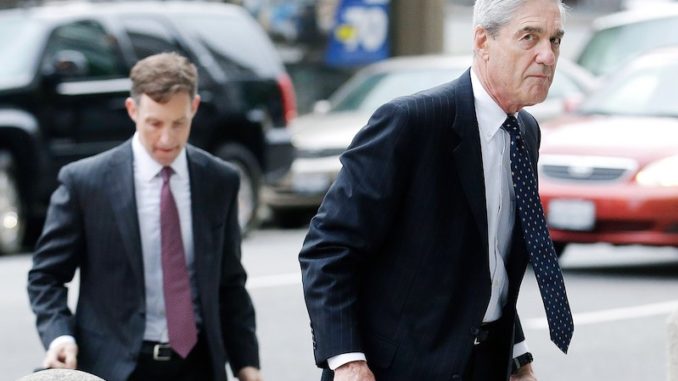
A senior FBI official overseeing the investigation into claims that Russia meddled in the U.S. election has quit following a distinct lack of evidence in the case.
Jeffrey Tricoli had been coleading the FBI foreign influence task force, but resigned in June just months ahead of the 2018 midterm elections.

BYPASS THE CENSORS
Sign up to get unfiltered news delivered straight to your inbox.
You can unsubscribe any time. By subscribing you agree to our Terms of Use
Latest Video
Wsj.com reports: Mr. Tricoli, an 18-year veteran of the FBI who became a section chief of the bureau’s cyber division in December 2016, didn’t respond to requests for comment sent to his personal email and LinkedIn account. An FBI spokeswoman declined to comment on Mr. Tricoli’s status, saying the Bureau doesn’t discuss personnel matters.
The reason for Mr. Tricoli’s departure wasn’t clear. But it adds to questions among some tech companies and lawmakers about how much the administration, and the task force in particular, are doing to protect future elections from Russian meddling.
This comes as the potential threat from foreign interference was underscored by a new indictment Friday from Special Counsel Robert Mueller, charging 12 Russians with a widespread conspiracy to steal thousands of emails from Democratic Party organizations and then ensure they became public in ways that would embarrass the Clinton campaign.
Clint Watts, a former FBI agent and author of a book about information wars on social media, said the Trump administration has shown little interest in addressing Russian meddling, leaving the FBI’s efforts to tackle foreign influence “reactive” instead of anticipatory.
The FBI, in a statement, said the task force has been forging ahead since it was created last year by Director Christopher Wray, though the Bureau declined to provide details.
“The FBI takes any effort to interfere with our democratic institutions extremely seriously,” it said. “For that reason, last year, Director Wray announced the Foreign Influence Task Force. Since its creation, the FITF has been an active, forward-looking task force.”
By bringing in representatives of FBI units and coordinating with state, federal and private organizations, the task force allows the Bureau “to share information and protect our democratic institutions from foreign influence,” the FBI said.
It wasn’t clear if a replacement for Mr. Tricoli has been selected. In January, Mr. Tricoli said publicly he was leading the task force alongside an unnamed counterpart in the FBI’s counterintelligence division.
Some technology companies and congressional investigators say privately that the task force has produced little in the way of concrete recommendations or initiatives since being formed last year, and that it lacks a clear agenda.
“So far there has not been a lot of substance yet from the task force,” said a congressional intelligence panel staffer who has been briefed on its activities. The official said it wasn’t unusual for new government task forces to progress slowly, however, comparing the foreign influence unit to the initially sluggish efforts by the Obama administration to address online terrorist propaganda.
Mr. Wray set up the task force last year to work in coordination with the Department of Homeland Security and other agencies to tackle the threat posed by Russia and other hostile foreign nations seeking to use social media or other means to influence U.S. domestic politics or amplify societal divisions.
The task force is designed to involve relevant FBI personnel from a variety of departments, including counterintelligence, cybercrime and criminal. It is separate from the investigation into Russian meddling and potential collusion with President Donald Trump’s campaign being run by Mr. Mueller.
Mr. Tricoli’s departure comes months ahead of Nov. 6, when voters will cast ballots in the heated midterm elections as Republicans fight to hold their majorities in the House and Senate.
Government efforts to fend off election-related cyberattacks have been bifurcated into two categories: Preventing cyberattacks on election systems, such as voting machines and voter registration files, and limiting the amount of disinformation peddled by trolls on social media.
Safeguarding physical and digital election equipment, such as voting machines and voter registration files, has fallen under the purview of the cyber wing of DHS, which has worked closely with state election officials to make those systems more resilient and open to audits.
The FBI has been the de facto lead on dealing with the less-tangible problem of foreign influence operations that target U.S. elections. Russian trolls, often posing as Americans, leveraged thousands of accounts on Facebook and Twitter to expose hundreds of millions of users to disinformation in the run-up to the 2016 election, the companies have said.
The foreign-influence task force’s work has been largely secret since its inception, and Mr. Tricoli seldom spoke publicly about it. At an FBI conference in New York in January, he described it as an attempt to share more information with the technology companies and other stakeholders, while being wary that such outreach could clash with concerns about monitoring political speech.
“We’re not here to be the thought police,” Mr. Tricoli said at the conference.
Along with representatives from DHS, the FBI unit met in late May with several major internet companies at Facebook headquarters in Menlo Park, Calif., to discuss protecting the midterm elections from foreign propaganda, according to people familiar with the summit. That meeting, previously reported by the New York Times, left some tech companies in attendance believing that the government wasn’t seriously committed to collaborating to deter foreign-sponsored election-interference campaigns.
Government agencies and some lawmakers on the congressional intelligence panels have countered that Silicon Valley needs to accept primary responsibility for detecting and purging propaganda campaigns on their networks.


